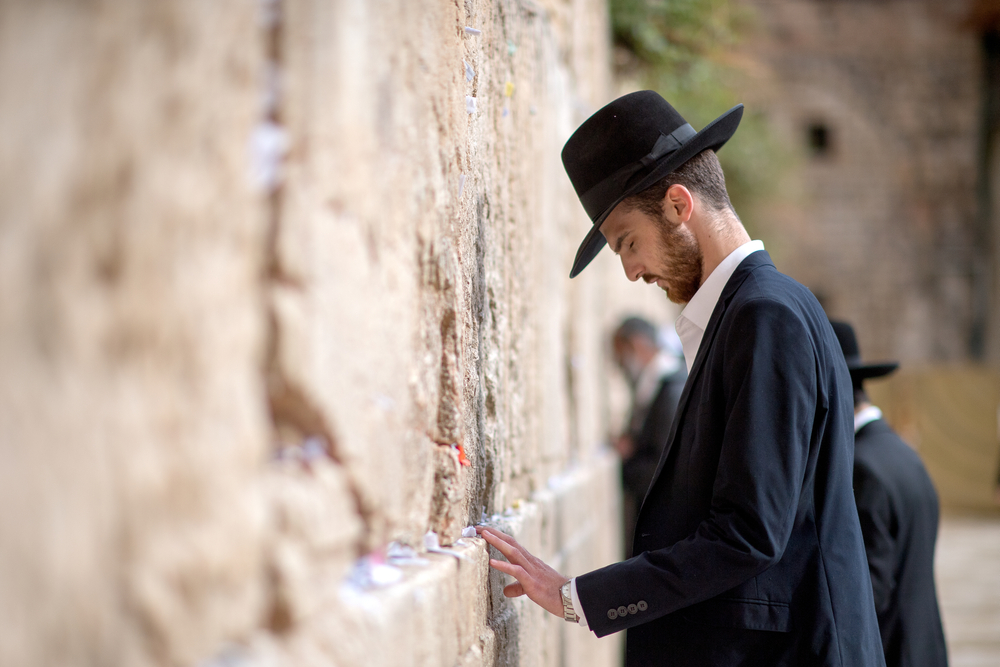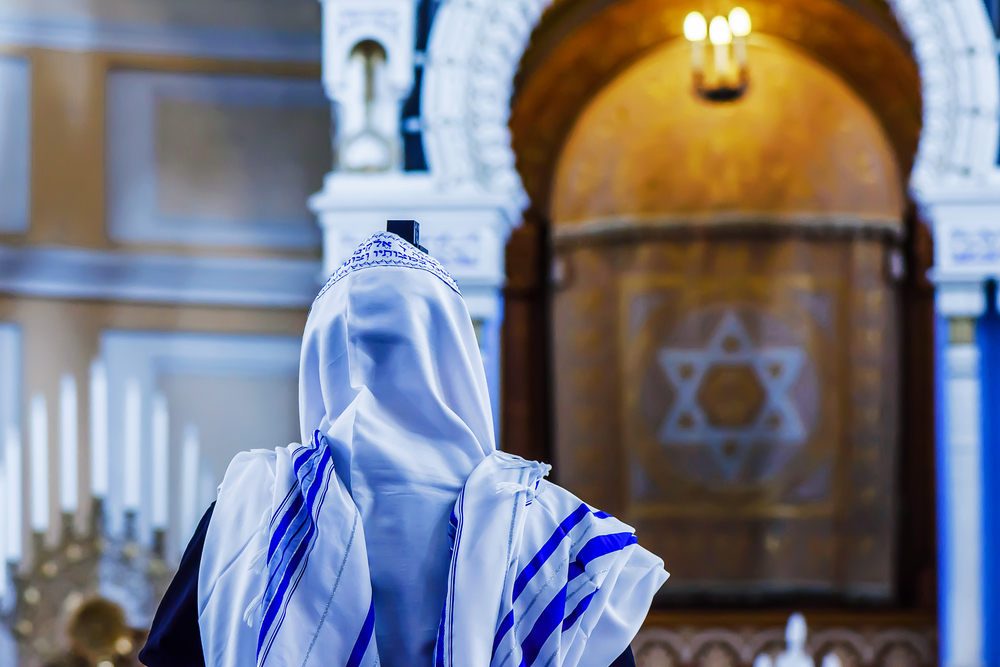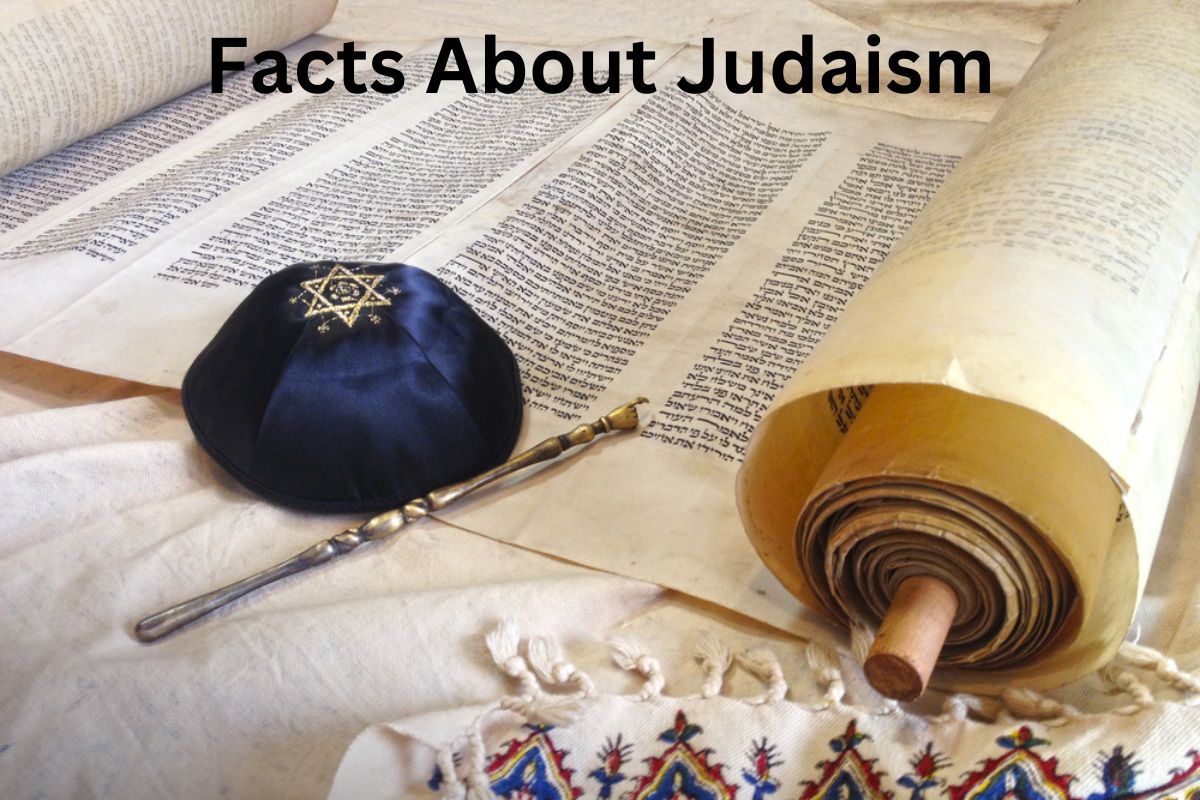Judaism is one of the oldest and influential monotheistic religions in the world. With roots dating back more than 3,000 years, it has shaped the lives, beliefs, and cultural practices of Jewish communities worldwide.
Judaism is characterized by a rich tapestry of religious traditions, ethical values, and a deep connection to the historical and spiritual homeland of the Jewish people, Israel.
Judaism places a strong emphasis on communal worship and learning. Synagogues serve as the central gathering places for Jewish prayer services, study sessions, and communal events.
The Sabbath, which begins at sunset on Friday and ends at nightfall on Saturday, is a sacred day of rest and worship. It is observed through prayer, study, spending time with family, and refraining from work.
Judaism Facts
1. Judaism is one of the oldest monotheistic religions in the world
Judaism’s origins can be traced back to ancient times in the Middle East. It emerged as a monotheistic faith with the teachings and experiences of the Hebrew patriarchs and prophets such as:
- Abraham
- Moses
- Isaiah
The historical events and narratives described in the Hebrew Bible form the foundation of Jewish beliefs and practices.
2. The central religious text of Judaism is the Hebrew Bible
The Hebrew Bible, known as the Tanakh, is a collection of sacred texts that encompasses various genres, including law, history, poetry, prophecy, and wisdom literature.
Also Read: Facts About Jehovah’s Witnesses
The Torah, which is the first five books of the Bible (Genesis, Exodus, Leviticus, Numbers, and Deuteronomy), is considered the most significant section.
It contains the core religious laws and narratives of Jewish history, including the story of creation, the Exodus from Egypt, and the giving of the Ten Commandments at Mount Sinai.

3. Jewish religious practices are guided by the Halakhah
The Halakhah is a comprehensive system of Jewish law and ethical guidelines that governs every aspect of life, including religious observance, personal conduct, family relationships, dietary regulations, and more.
Also Read: Mormons Facts
It is derived from the interpretation and application of the biblical commandments, as well as rabbinic traditions and legal discussions throughout history.
Jewish individuals and communities strive to live in accordance with the Halakhah, which provides a framework for a righteous and fulfilling life.
4. The holiest day in Judaism is the Sabbath
The Sabbath, known as Shabbat in Hebrew, is a central institution in Judaism. It begins at sunset on Friday and ends at nightfall on Saturday.
During this time, Jews refrain from work and engage in prayer, study, spending time with family, and enjoying meals together. The observance of the Sabbath is a way of acknowledging and participating in God’s rest after the six days of creation as described in the Book of Genesis.
It is considered a holy day of spiritual renewal and a reminder of the importance of rest and reflection in one’s life.
5. Jews celebrate a number of festivals throughout the year
Judaism celebrates a variety of festivals throughout the year, each with its unique significance and rituals.
- Passover (Pesach) commemorates the liberation of the Israelites from slavery in ancient Egypt, with a focus on the retelling of the Exodus story and the symbolic elements of the Seder meal.
- Rosh Hashanah marks the Jewish New Year, a time of introspection, repentance, and renewal.
- Yom Kippur, observed ten days after Rosh Hashanah, is the Day of Atonement when Jews engage in fasting, prayer, and seeking forgiveness for their sins.
- Hanukkah celebrates the rededication of the Second Temple in Jerusalem and the miracle of the oil that lasted for eight days.
These festivals, among others like Sukkot, Purim, and Shavuot, play a crucial role in strengthening Jewish identity, reinforcing historical connections, and promoting communal unity.
6. Circumcision (brit milah) is a significant ritual in Judaism
Circumcision, known as brit milah, is a significant ritual in Judaism that symbolizes the covenant between God and the Jewish people.
It involves the removal of the foreskin of male infants on their eighth day of life. This practice is rooted in the biblical narrative of Abraham, who circumcised himself and his descendants as a sign of his commitment to God.
Brit milah is usually conducted by a trained religious practitioner called a mohel, and it is accompanied by prayers, blessings, and a celebratory gathering of family and friends.

7. Synagogues are the central places of worship in Judaism
Synagogues serve as the central houses of worship and community gathering places in Judaism. They provide a space for prayer services, Torah study, lifecycle events, and communal activities.
Synagogues vary in architectural styles and practices, but they typically contain an ark (a cabinet where the Torah scrolls are stored), a bimah (a raised platform from which the Torah is read), and seating for congregants.
Synagogues also serve as educational centers, hosting religious schools and adult learning programs to promote Jewish education and knowledge.
8. The Western Wall (also known as the Wailing Wall) in Jerusalem is considered the holiest site in Judaism
The Western Wall, also known as the Wailing Wall, is located in the Old City of Jerusalem and is considered the holiest site in Judaism. It is a remnant of the retaining wall that surrounded the Second Temple, which was destroyed by the Romans in 70 CE.
The Western Wall has become a place of deep religious significance and a site of prayer and pilgrimage for Jews from around the world. Many visitors leave written prayers, called kvitlach or notes, in the crevices of the wall.
The Western Wall Plaza is a vibrant gathering place for religious ceremonies, celebrations, and moments of reflection.
9. The State of Israel holds special significance in Judaism as the historical and spiritual homeland of the Jewish people
The State of Israel holds a central place in Judaism as the historical and spiritual homeland of the Jewish people. For centuries, Jews prayed for a return to the land of Israel, and the establishment of the modern State of Israel in 1948 fulfilled that aspiration.
Israel serves as a focal point of Jewish identity and is considered a place of refuge and belonging for Jews worldwide. Many Jewish holidays, rituals, and customs are deeply connected to the land and history of Israel. Jerusalem, as the capital of Israel, is particularly revered due to its historical and religious significance.
10. There are different branches within Judaism, including Orthodox, Conservative, Reform, and Reconstructionist Judaism
Judaism encompasses various branches, each with its own approach to religious practice and interpretation of Jewish law.
Orthodox Judaism adheres closely to traditional Jewish law and rituals, emphasizing the authority of the Halakhah.
Conservative Judaism seeks to strike a balance between tradition and modernity, adapting some practices while maintaining a commitment to Jewish law.
Reform Judaism emphasizes personal autonomy and adapting to contemporary values, often interpreting Jewish law in a more flexible manner.
Reconstructionist Judaism views Judaism as an evolving civilization and focuses on Jewish culture and ethics.
These branches reflect the diversity of Jewish thought and practice, providing different paths for individuals to engage with their faith and heritage.
11. Jewish dietary laws, known as Kashrut, outline the food that is considered kosher
Kashrut, the Jewish dietary laws, plays a significant role in Jewish observance. The rules of kashrut outline the types of food that are considered kosher, which means “fit” or “proper” for consumption.
These laws prohibit the mixing of meat and dairy products, and certain animals, such as pigs and shellfish, are considered non-kosher. Kosher meat must come from animals that have been slaughtered according to specific rituals and under rabbinic supervision.
Additionally, kosher food products must be certified by a reliable kosher certification agency. Observing kashrut serves as a reminder of the importance of mindfulness and ethical considerations in everyday actions.
12. Jewish weddings traditionally involve the signing of a marriage contract called a Ketubah
Jewish weddings are joyous celebrations that involve various customs and rituals. One essential element is the signing of the Ketubah, a marriage contract that outlines the rights and responsibilities of both partners.
The Ketubah serves as a legal and moral commitment between the couple, emphasizing the importance of mutual respect, support, and fidelity. The wedding ceremony itself, known as the chuppah, typically takes place under a canopy symbolizing the couple’s future home together.
It involves the recitation of blessings, the exchange of rings, and the breaking of a glass to remember the destruction of the Temple in Jerusalem.
13. Jewish mourning practices include a period of intense mourning called Shiva
Jewish mourning practices provide a structured framework for grieving and honoring the deceased. When a loved one passes away, the immediate family enters a period of intense mourning known as Shiva.
During this seven-day period, mourners stay at home and receive visitors who offer condolences and support. Prayers and readings are recited, and it is customary for mourners to refrain from engaging in certain activities such as shaving or wearing new clothes.
After Shiva, there are additional mourning periods with decreasing levels of intensity, such as Sheloshim (30 days) and the entire first year. These mourning practices help individuals navigate the grieving process and find solace within the community.
14. Jewish identity is passed down matrilineally
Jewish identity is matrilineal, meaning that a person is considered Jewish if their mother is Jewish. This principle, known as “Jewish descent through the mother,” has been a longstanding tradition in Jewish law.
However, various Jewish movements have different approaches to this concept, with some recognizing patrilineal descent as well. Conversion to Judaism is another pathway to Jewish identity, involving a process of study, acceptance of Jewish beliefs and practices, and immersion in a ritual bath called a mikveh.
Jewish identity is often shaped by a combination of religious observance, cultural heritage, and personal connection to the Jewish community.
15. Jews have made significant contributions to various fields, including science, philosophy, literature, art, and music
Jewish individuals have made significant contributions to various fields throughout history. In the realm of science, Albert Einstein, a renowned physicist, developed the theory of relativity, while Jonas Salk, a medical researcher, developed the polio vaccine.
Sigmund Freud, the founder of psychoanalysis, revolutionized the field of psychology. Jewish authors and philosophers, such as Franz Kafka and Martin Buber, have produced influential works exploring human existence and societal issues.
In the arts, Jewish musicians, composers, and actors, including Bob Dylan, Leonard Bernstein, and Barbra Streisand, have achieved great acclaim. Jewish contributions span diverse areas of human achievement, leaving a lasting impact on culture, intellectual pursuits, and creative endeavors.
